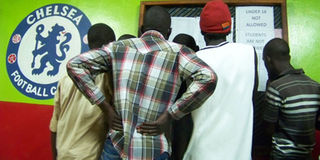Betting on Uganda Premier League games is a delicate slip to balance

Whereas most betting houses offer odds on foreign matches, some have taken on UPL games. FILE Photo
What you need to know:
Comment. It is much easier for a UPL player, whose Shs200,000-a-month wages have not been paid for four months, to accept Shs50,000 and play-act than a Wayne Rooney taking home in excesses of £250,000 (over Shs1b) a week. But one inescapable fact is that betting is here for good
By now you must be aware that it is no longer a rumour. And by now, if you are your legend bettor already; you should be concluding your permutations before staking your claim for tomorrow’s Uganda Premier League (UPL) action.
Unless otherwise, SC Villa-KCC, Entebbe-Bul, Lweza-URA and Soana-Vipers will sure be among the several football matches listed by a number of betting houses in the country tomorrow.
Mind you, there is no crime in betting houses listing local football league games as gambling is a legal industry regulated by the National Lotteries Board (NLB). It is also run under the umbrella body Sports Betting Association of Uganda.
But there is no escaping concerns the new-found betting on UPL games has raised amongst stakeholders.
Many fear that the game could now be vulnerable to match-fixing as a result of betting; especially when you consider the economic hardships local clubs, coaches, players, referees and some sports administrators endure.
Since Daily Monitor exclusively published that story yesterday, I have received several voices praying that we do away with betting as it will kill our already vulnerable and young league, which is still fighting to recover from long-waged wrangles.
Other calls have asked stakeholders to chart ways of seeing this work outside footballers, coaches, referees, and all involved in the operation of the game.
Worldwide phenomenon
But let’s face it, sports betting is a wave that has swept across the globe and soon it will go beyond local football into cricket, rugby and basketball.
Gambling is now a billion dollar industry. Sports betting estimations alone as of last October, which include both illegal markets and legal markets, is said to be worth between $700bn and $1tn (Shs1.8-2.8 quadrillion) a year, according to BBC.
About 70 per cent of that trade has been estimated to come from trading on football, with growth of the internet and mobile devices with quick access to odds making betting generally much more accessible.
Increased coverage of live football matches around the world has also increased interest and opportunity.
Today, punters stake money on the action as it happens, say; who will score the next goal, with odds fluctuating on the blueprint of play.
It has become increasingly acceptable that betting companies now sponsor leagues and clubs, plus rake in revenues to governments in billions.
Last financial year alone in Uganda, gambling fetched Shs8b with projections for higher figures in the next.
Betting and sports are increasingly becoming hard to differentiate. They feed off each other.
Betting companies such as Bwin formerly graced the front of Real Madrid shirts. Actually, Bwin is now the official Gaming and Betting Partner of Manchester United.
UK bookmaker William Hill is also the official betting partner of Southampton while 666Bet is Leicester’s.
Back home, Kings Bet proudly and fondly displays on the front of Bright Stars jerseys and the club get some money from the company to help offset bills because of that partnership - hardly an illegality in itself.
England’s lower tier competition, the Football League, is also running a five-year sponsorship deal said to be worth around £6m a year with Sky Bet. The more you look into it the more you realise sports betting has come and is here to stay.
But that is not to suggest that the game’s soul should completely be sold as the Barclays Premier League chief executive Richard Scudamore said in May.
“Our title sponsorship is not for everybody,” he said, then. “It’s not a straightforward, ‘we’ll take any brand that comes along’, it’s more complex than that. I think betting would be very difficult.”
Scudamore, keen to maintain the integrity of the game, was responding to suggestions that top betting companies could bid to take over from Barclays after the current sponsor hinted at ending its £40m-a-year sponsorship when the current deal runs out in 2016.
But while - in the interim - he will save that topflight soul; that is just as far as Scudamore can go. That is just as far as Fufa back home can go as well as they cannot stop betting.
All they can do is put stringent measures, like the integrity and compliance committee Fufa president Moses Magogo alluded to in our Wednesday story.
That would help guard against pre-determined results and ensure coaches, referees, players and administrators do not bet on or fix games – as difficult as that sounds.
For starters, a good number of UPL players are active bettors already. Add the non-payment of wages, the dire financial situation of their clubs and referees, and the allure of making that meager Shs50,000 to strike the ball into your net or earn that red card in the 79th minute and the whole thing becomes Sudoku.
It is much easier for a UPL player, whose Shs200,000 a month wages have not been paid for four months to accept Shs50,000 and play-act than a Wayne Rooney taking home in excesses of £250,000 (over Shs1b) a week.
Circumstances currently give a clear indictment that we are not ready to embrace betting, yet we cannot also push it away for it is upon us.
It is a global trend that odds of it being kept out of our game are virtually non-existent. If only players, referees and coaches could stay out of it.
If only Fufa, who must clean themselves in the first place, follow through stringently their integrity committee’s commitments.
If only!
[email protected], @TheLoveDre on Twitter




